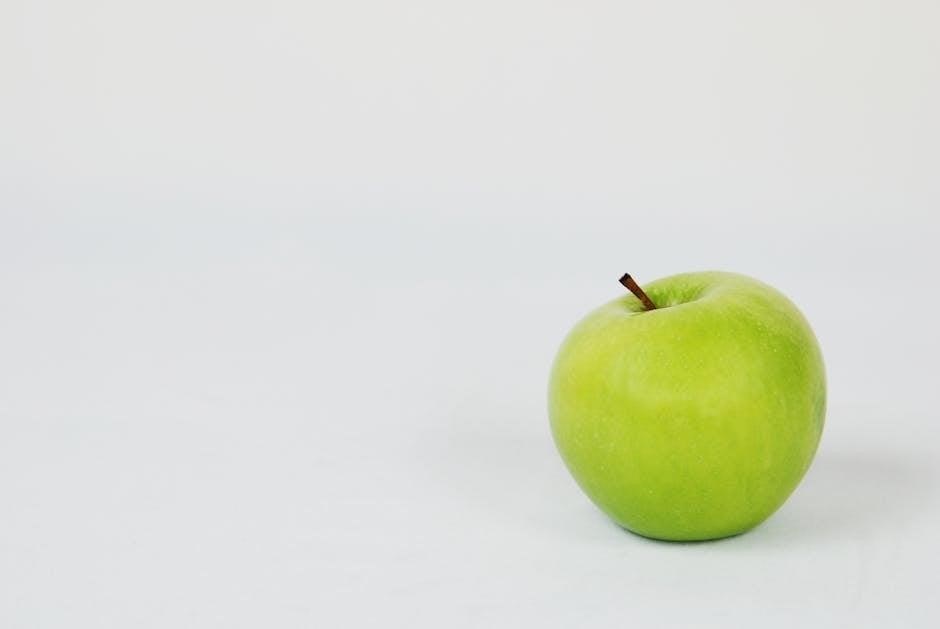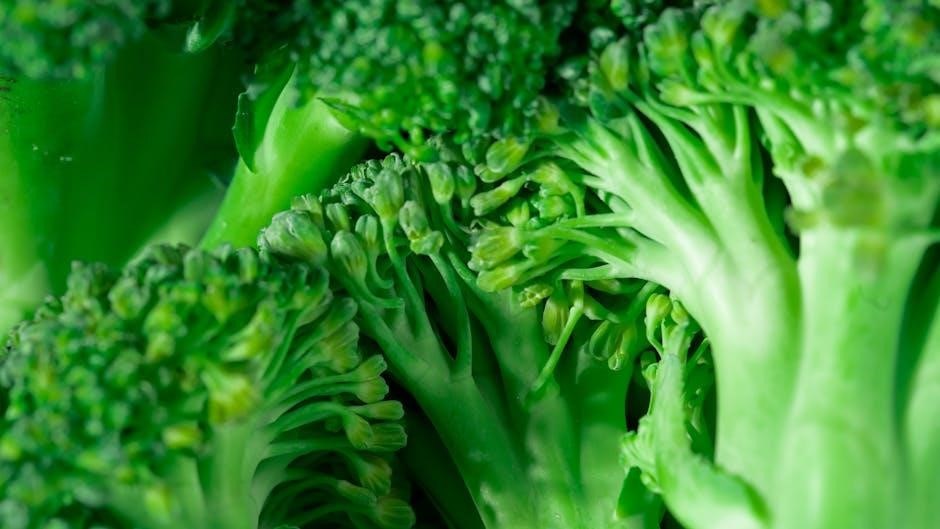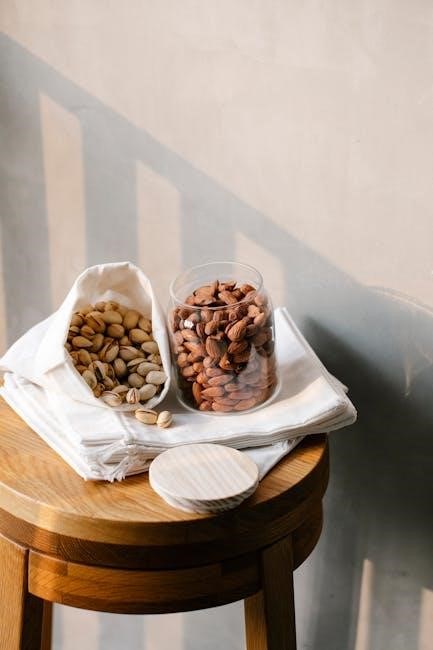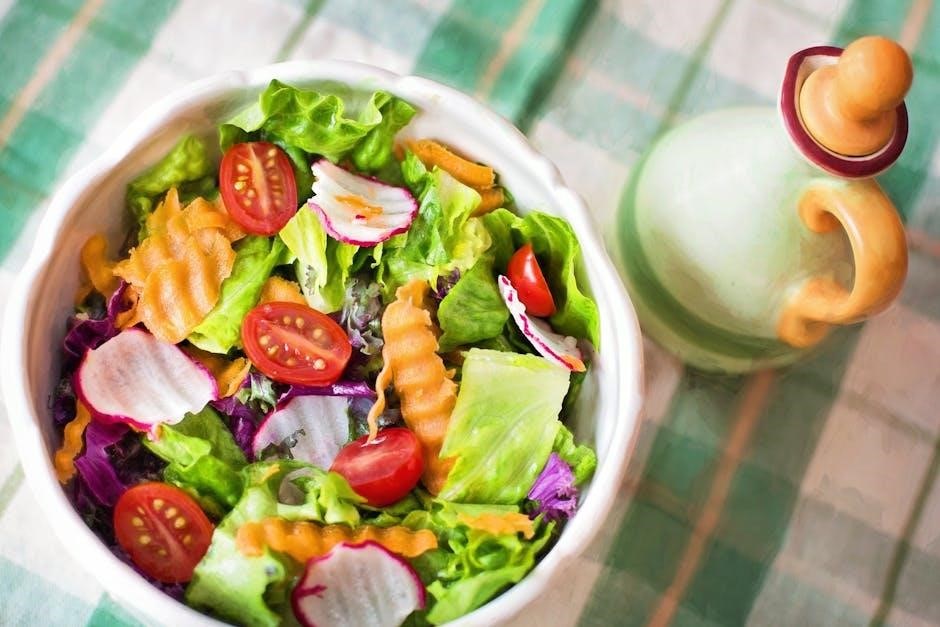A plant-based diet focuses on whole, minimally processed foods, excluding animal products, and emphasizing fruits, vegetables, whole grains, legumes, and healthy fats. A downloadable PDF list provides a clear guide for meal planning and grocery shopping, making it easier to adopt this lifestyle. It’s a sustainable and nutritious approach to improving overall health and well-being.

Core Principles of a Plant-Based Diet
A plant-based diet excludes animal products, focusing on whole, minimally processed foods like fruits, vegetables, grains, and legumes. It emphasizes natural, nutrient-dense ingredients for optimal health.
Definition and Key Concepts
A plant-based diet is a dietary lifestyle centered around foods derived from plants, excluding all animal products like meat, dairy, eggs, and honey. It emphasizes whole, minimally processed foods such as fruits, vegetables, whole grains, legumes, nuts, and seeds. The key concept is to focus on nutrient-dense ingredients that provide essential vitamins, minerals, and fiber. This approach aims to promote health and sustainability by reducing reliance on animal-derived products. A plant-based diet is not just a restrictive eating plan but a holistic way of living that encourages mindful consumption of natural, wholesome foods.
Elimination of Animal Products
The foundation of a plant-based diet involves the complete elimination of all animal-derived products. This includes meat, poultry, fish, dairy, eggs, and even honey. By excluding these foods, the diet focuses solely on plant-based sources of nutrition. This shift not only supports health but also aligns with ethical and environmental values. Animal products are replaced with alternatives like plant-based milks, vegan proteins, and cruelty-free ingredients. This elimination ensures that the diet remains free from cholesterol and saturated fats commonly found in animal products, promoting a healthier lifestyle. Transitioning to a plant-based diet requires careful planning to ensure all nutritional needs are met without relying on animal sources.
Incorporation of Whole, Minimally Processed Foods
A plant-based diet emphasizes the inclusion of whole, minimally processed foods to ensure maximum nutritional benefit. These foods, such as fruits, vegetables, whole grains, legumes, nuts, and seeds, are rich in vitamins, minerals, and fiber. By focusing on unprocessed ingredients, the diet avoids unhealthy additives like excess sugar, salt, and artificial preservatives. Whole foods provide sustained energy and support overall health, making them a cornerstone of a balanced plant-based lifestyle. This approach encourages mindful eating and prepares meals from scratch, fostering a deeper connection with food and its natural benefits. Incorporating these foods is essential for maintaining a diverse and nutritious diet that aligns with the principles of plant-based eating.

Essential Foods in a Plant-Based Diet
A plant-based diet relies on whole, nutrient-rich foods like fruits, vegetables, whole grains, legumes, nuts, seeds, and healthy fats. These foods provide essential vitamins, minerals, and fiber, supporting overall health and well-being. They are the foundation for creating balanced, satisfying meals that align with plant-based principles.
Fruits
Fruits are a vibrant and essential part of a plant-based diet, offering natural sweetness, vitamins, and antioxidants. They include berries, citrus fruits, apples, bananas, and tropical options like mangoes and pineapples. Fruits are rich in fiber, which supports digestive health, and provide essential nutrients like vitamin C, potassium, and folate. Incorporating a variety of fruits into your meals and snacks ensures a broad range of flavors and nutrients. Many fruits are versatile, making them perfect for smoothies, salads, or as a quick, healthy snack. A plant-based diet food list PDF often highlights seasonal fruits to encourage sustainable and fresh eating habits. Including fruits in your daily intake helps maintain energy levels and overall well-being, making them a foundational component of a balanced plant-based lifestyle.
Vegetables
Vegetables are a cornerstone of a plant-based diet, providing essential nutrients, fiber, and antioxidants. They come in a wide variety, including leafy greens, cruciferous vegetables, root vegetables, and colorful options like bell peppers and carrots. Leafy greens such as spinach, kale, and broccoli are rich in vitamins A, C, and K, as well as minerals like calcium and iron. Cruciferous vegetables, including cauliflower and Brussels sprouts, are known for their cancer-fighting properties. Root vegetables, such as sweet potatoes and beets, offer complex carbohydrates and fiber, supporting healthy digestion. Incorporating a diverse array of vegetables ensures a broad spectrum of nutrients and flavors. A plant-based diet food list PDF often categorizes vegetables by type, making it easier to plan balanced meals and snacks. Vegetables are versatile and can be prepared in countless ways, from raw salads to roasted dishes, ensuring variety and nutrition in your diet.
Whole Grains
Whole grains are a fundamental component of a plant-based diet, offering a rich source of complex carbohydrates, fiber, vitamins, and minerals. They include options like quinoa, brown rice, oats, barley, and whole wheat, which provide sustained energy and support healthy digestion. Unlike refined grains, whole grains retain their nutrient-dense bran, germ, and endosperm, making them a more nutritious choice. Incorporating whole grains into meals helps satisfy hunger and ensures a balanced intake of essential nutrients. A plant-based diet food list PDF often highlights a variety of whole grains, encouraging their inclusion in breakfast, lunch, and dinner recipes. They are versatile and can be prepared in numerous ways, from hearty salads to warm, comforting dishes, making them an indispensable part of a healthy, plant-based lifestyle.
Legumes and Beans
Legumes and beans are vital in a plant-based diet, providing abundant protein, fiber, and essential nutrients. They are versatile and can be incorporated into various dishes, from hearty stews to salads. Common varieties include lentils, chickpeas, black beans, and kidney beans. These foods are not only nutritious but also budget-friendly and sustainable. A plant-based diet food list PDF often highlights legumes and beans as staples, offering numerous health benefits and culinary possibilities. They help maintain satiety and support overall well-being, making them a cornerstone of balanced, plant-based eating. By including a variety of legumes and beans in your meals, you can ensure a diverse and nutrient-rich dietary routine that aligns with the principles of whole, minimally processed foods.
Nuts and Seeds
Nuts and seeds are essential components of a plant-based diet, offering a rich source of healthy fats, protein, and essential nutrients. They provide energy and support heart health, while also adding texture and flavor to meals. Popular choices include almonds, walnuts, chia seeds, flaxseeds, and sunflower seeds. A plant-based diet food list PDF often includes these items as they are versatile and can be easily incorporated into snacks, smoothies, and recipes. Nuts and seeds are also rich in antioxidants and fiber, promoting overall well-being. However, they should be consumed in moderation due to their calorie density. Including a variety of nuts and seeds ensures a balanced intake of nutrients, supporting a healthy and satisfying plant-based lifestyle that aligns with whole, minimally processed food principles;

Dairy Alternatives

Dairy alternatives are a cornerstone of a plant-based diet, offering cruelty-free and environmentally friendly options. Plant-based milk such as almond, oat, soy, and coconut milk are popular choices, providing essential nutrients like calcium and vitamins. Yogurt alternatives, made from coconut milk or almond milk, are also widely available. Cheese substitutes, crafted from nuts, seeds, or soy, cater to those seeking dairy-free indulgence. These alternatives are often fortified with nutrients, ensuring they meet dietary needs. A plant-based diet food list PDF typically includes these options, making it easier to navigate grocery shopping. While convenient, some products may contain additives, so opting for unflavored, unsweetened varieties is recommended for a healthier choice. Incorporating these dairy alternatives supports a balanced and satisfying plant-based lifestyle, aligning with whole, minimally processed food principles. They are versatile and can enhance both sweet and savory dishes seamlessly.
Healthy Fats
Healthy fats are a vital component of a plant-based diet, providing essential nutrients and energy. Nuts, seeds, avocados, and olive oil are excellent sources of healthy fats. These foods are rich in monounsaturated and polyunsaturated fats, which support heart health and brain function. Incorporating these into meals enhances flavor and satisfaction. A plant-based diet food list PDF often highlights these options, making it easier to include them in daily meals. Omega-3 fatty acids, found in flaxseeds, chia seeds, and walnuts, are crucial for overall well-being. Avocados add creaminess and boost nutrient absorption from other foods. Healthy fats are a cornerstone of balanced nutrition, ensuring a satisfying and nutritious plant-based lifestyle. They also contribute to satiety, making them a great addition to snacks and meals alike. Always opt for whole food sources rather than processed options to maximize benefits.
Plant-Based Snacks
Plant-based snacks are a delicious and convenient way to stay satisfied between meals. Nuts, seeds, and fresh fruits are popular choices, offering healthy fats, protein, and fiber. Energy balls made from oats, dates, and nut butter are a tasty, portable option. Veggie sticks with hummus or guacamole provide a crunchy, nutrient-rich snack. Whole grain crackers with avocado or nut butter are also satisfying. Trail mix with nuts, seeds, and dried fruits is a versatile snack for on-the-go. Dark chocolate with high cocoa content is a sweet treat option. Additionally, homemade popsicles made from fruit purees offer a refreshing choice. These snacks are easy to prepare and can be found in a plant-based diet food list PDF, ensuring variety and nutrition in your daily routine. They’re perfect for maintaining energy levels and supporting overall well-being.
Beverages
Plant-based beverages are a refreshing and essential part of a plant-based diet. Herbal teas, fruit-infused water, and plant-based milk alternatives like almond, oat, and soy milk are popular choices. Fresh vegetable juices, such as carrot or beetroot, provide a nutrient-packed option. Smoothies made with fruits, greens, and nut butters are a quick and nutritious drink. Coconut water is a great source of electrolytes, perfect for hydration. For those who enjoy something fizzy, kombucha and sparkling water with natural flavors are excellent alternatives to soda. These beverages are not only delicious but also align with the principles of a plant-based lifestyle, offering numerous health benefits and variety to your daily routine. They can be easily incorporated into your diet using a plant-based diet food list PDF for guidance. Stay hydrated and energized with these wholesome options!

Meal Planning and Preparation
Plan balanced meals using a plant-based diet food list PDF. Incorporate whole foods and fresh ingredients, and rely on a grocery list for easy, healthy meal preparation. This approach ensures variety and nutrition, making mealtime enjoyable and sustainable.
Breakfast Ideas
Start your day with delicious and nutritious plant-based breakfast options. Oatmeal topped with fresh fruits and nuts is a hearty choice. Smoothies made with spinach, bananas, and almond milk provide a quick and energizing start. Whole grain toast with avocado or hummus offers healthy fats and fiber. Chia pudding with berries and coconut flakes is another tasty option. For a breakfast on-the-go, try overnight oats or energy balls made from oats, nuts, and dried fruits. Incorporate plant-based yogurt with granola and fresh berries for a light yet satisfying meal. These ideas are easy to prepare and align perfectly with a plant-based diet food list PDF, ensuring a balanced and flavorful beginning to your day.
Lunch Ideas
Plant-based lunches can be both nutritious and satisfying. Consider whole grain wraps filled with roasted vegetables, hummus, and mixed greens. Quinoa or brown rice salads with chickpeas, avocado, and a citrus vinaigrette make for hearty options. Lentil or vegetable soups paired with a side of steamed greens are comforting and filling. Stir-fries with tofu, mixed vegetables, and whole grain noodles are quick and flavorful. Veggie sushi rolls or black bean tacos with guacamole and salsa also provide variety. These ideas align perfectly with a plant-based diet food list PDF, ensuring a balanced and delicious meal. They are easy to prepare and packed with essential nutrients, making them ideal for a midday meal.
Dinner Ideas
Plant-based dinners can be hearty and flavorful. Consider stuffed bell peppers with quinoa, black beans, and spices for a nutritious meal. Lentil or vegetable curry served over brown rice is another delicious option. Roasted vegetable bowls with chickpeas, avocado, and tahini dressing make for a satisfying dinner. Whole grain pasta with marinara sauce, sautéed spinach, and roasted eggplant is a classic choice. Stir-fries with tofu, mixed vegetables, and tamari can be prepared quickly. Veggie burgers on whole grain buns with sweet potato fries are a tasty option. These dinner ideas are easy to prepare, packed with nutrients, and align perfectly with a plant-based diet food list PDF, ensuring a balanced and enjoyable evening meal.

Grocery Shopping List
A well-organized plant-based grocery list includes pantry staples, fresh produce, refrigerated items, and frozen foods. Downloadable PDF versions simplify shopping, ensuring all essentials are covered for balanced meals.
Pantry Staples
Pantry staples form the foundation of a plant-based diet, offering convenience and versatility. Essential items include whole grains like brown rice, quinoa, and oats, which provide sustained energy and fiber. Canned beans and legumes, such as lentils, chickpeas, and black beans, are rich in protein and can be used in a variety of dishes. Nutritional yeast adds a cheesy flavor to recipes, while spices and herbs enhance meal flavors without added salt or sugar. Vinegars, such as apple cider and balsamic, are great for dressings and marinades. Healthy oils like olive and coconut oil are perfect for cooking. A well-stocked pantry ensures you can create delicious, balanced meals effortlessly. Downloadable PDF lists often categorize these items, making grocery shopping a breeze.

Refrigerated Items
Refrigerated items are crucial for maintaining freshness and variety in a plant-based diet. Fresh vegetables like spinach, kale, and broccoli are staples, while fruits such as apples, berries, and citrus add natural sweetness. Plant-based dairy alternatives, including almond, soy, and oat milk, are essential for smoothies and cereals. Tofu and tempeh provide versatile protein sources, while hummus and yogurt alternatives offer convenient snacks. Fresh herbs like parsley, basil, and cilantro enhance flavors in meals. These items, along with pre-washed greens and sliced vegetables, save time and encourage healthy eating. A well-stocked fridge supports meal planning and ensures a diverse, nutrient-rich diet. Downloadable PDF lists often highlight these essentials, making grocery shopping more efficient and organized.
Frozen Foods
Frozen foods are a convenient and nutritious addition to a plant-based diet. They include a variety of fruits like berries, bananas, and mangoes, which can be blended into smoothies or used in desserts. Vegetables such as broccoli, spinach, and peas are also widely available frozen, retaining much of their nutritional value. Additionally, many plant-based snacks and meals, like veggie burgers and falafel, can be found in the freezer section. These options are perfect for quick meals and add variety to your diet. Incorporating frozen foods ensures you have access to seasonal produce year-round and simplifies meal preparation. They can be easily added to stir-fries, soups, and casseroles, making them a versatile choice for any meal plan.
Downloadable PDF Grocery List
A downloadable PDF grocery list is a valuable resource for anyone adopting a plant-based diet. It provides a clear and organized guide to essential foods, ensuring you never miss an item while shopping. The list typically categorizes foods into sections like pantry staples, refrigerated items, and frozen foods, making it easy to navigate. It includes details such as fruits, vegetables, whole grains, legumes, nuts, seeds, and plant-based snacks. Many PDF lists also offer additional tips, such as budget-friendly options and seasonal produce recommendations. This tool helps streamline meal planning and grocery shopping, saving time and reducing confusion. By having a comprehensive PDF list, you can ensure your diet remains balanced and nutritious while adhering to plant-based principles.

